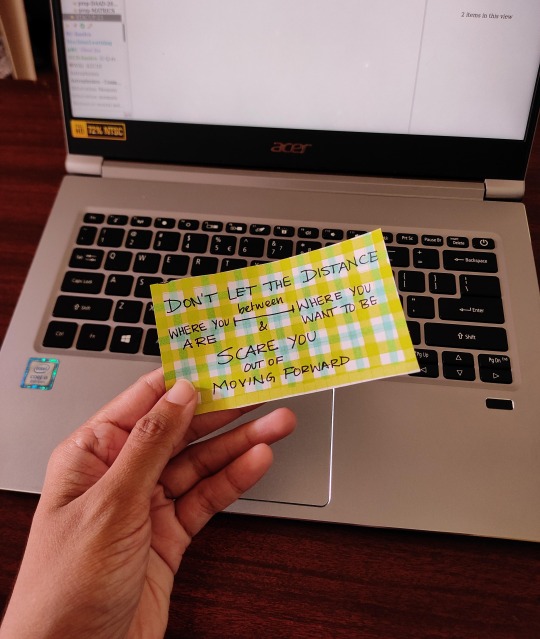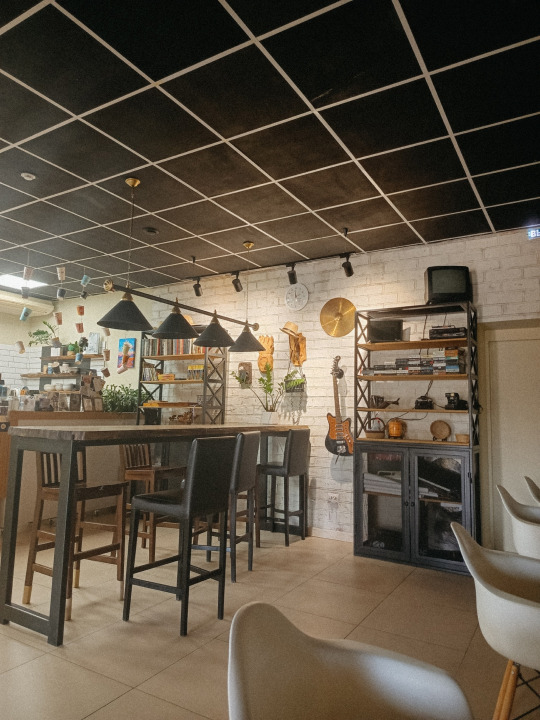#Phd tips
Explore tagged Tumblr posts
Text
Don't let the distance between where you are and where you want to be scare you out of moving forward.

But how?
This fear is like gravity. I can't feel it pulling me down, it is not prominent. It is not in the top of my head and making me fret every moment. It is not crushing or intense, it is not making me implode.
But it is there. It is keeping me from moving. I am paralyzed without even realizing. It has stopped me from being hopeful, or even looking at the future.
What's the cause? The distance between where I am and where I want to be, rather where I have to be. It is so far because I lagged behind once. And I am lagging behind still because the distance is daunting me now.
It's a loop. One thing feeds the other and vice versa. As time passes, the distance just keeps growing and I am standstill right where I was a year ago. And with the distance grows the fear. I get anxious more and more, and even simple tasks feel monstrous now. It is only a matter of time for me to succumb into the loop: to spiral into a blackhole.
How do I get out of this loop? How do I break this loop? How do I not let the distance scare me? Right now, I am all questions and no answers. I am writing this blog post to lift some weight off my chest and put it out in the open.
What helps you in such moments? Have you escaped the loop before? Or, are you too stuck in a loop like me?
#chaotic academia#gradblr#gradschool aesthetic#dark academia#studysthetics#uniblr#stemblr#physics phd#phd life#phdjourney#phd student#grad school#dissertation#university#academics#phdblr#phd guidance#phd stuff#phd tips#graduate school#phd anxiety#mental health in academia#fear of failure#phd problems#research process#advice for self
36 notes
·
View notes
Note
Hey, regarding the PhD path I can highly recommend it, and passion really goes a long way in the application. I have a PhD and I'm a researcher at a university, and I have a part in screening prospective students for our lab. The thing I can tell you with absolute confidence is that grades don't predict how good a person is going to be at a PhD, and the people hiring know this. People with immaculate grades aren't always cut out for the challenges of a PhD (and sometimes they are - grades alone aren't a strong predictor).
It's an entirely different skill set and the key skills are resilience, passion, and creativity. Passion being the most important by a long shot. During the course of the PhD any gaps in knowledge or weak areas will be filled. But PhDs are challenging and the thing that's going to get you to the end is passion and creativity. And that's what people are looking for most of all.
I'm not in Linguistics (but omg I wish I was, I love Linguistics so much I'm considering going back to uni and combining it with Arabic which I've been learning for a few years - your resources have helped so much!), but to give you an idea of numbers, I applied to 21 programmes here in the UK, I got 2 interviews, and I got 1 offer (I only went to one interview). But I didn't have a Master's degree, just the BSc, which was a disadvantage. The point being is to cast your net wide and don't give up or be too discouraged if it takes a while. If you want it to happen it'll happen - this stranger on the internet believes in you!
One interview tip: at the end, after you've pitched your thesis proposal and told them how passionate and dedicated you are, they'll say: "do you have any questions for us?". At this point, show them how serious you are and ask them: "given everything I've told you about my goals and intentions, is this the place for me? Can you provide me with the environment and resources I need to achieve my goals?". It shows that you aren't just desperate for any position, you're willing to look elsewhere, you have options. It might be a bluff, but it'll make them want you more, especially if they suddenly think you might go somewhere else.
Best of luck! Sorry for the long ask!
Thank you so much for the tips! And don't worry about the length of the ask :)
I'm definitely going to keep this in mind! I'm planning on applying for a handful of places with good funding opportunities and just hope I'm lucky (or try again next year) and I definitely have a lot of passion. Like a lot. I've been telling every living soul about my current thesis project for a year now.
Based on what I've been through I'm also very resilient. Everyone tells me how tough a PhD is and I definitely believe them but I've also been through a lot so I am very convinced my passion and resilience would make me ideal for that kinda environment.
22 notes
·
View notes
Text
endless list of fascinating ding yuxi facts in no particular order
his ideal job besides acting would be museum guard bc he'd get to admire the exhibits all day for free
majored in directing at shanghai theatre academy
gets embarrassed when dubbing his own scenes
used to be a lanky little dude and thus thought dayu (big yu) would be a fitting nickname to use. now he's all buffed up and goes by xiaoding (little ding)
named his fandom haitang bc there's an animated movie called dayu haitang (big fish & begonia)
irl disney princess: animals inexplicably swarm him no matter where he goes (real)
self-proclaimed disney princess
has insane chemistry even with inanimate objects but apparently it's because he's severely nearsighted
thinks his best angle is the back of his head
had to explain slang words and exemplified by looking straight into the camera and saying *in perfect english* "you look SNATCHED in that t-shirt"
played a white cat demon
adopted a white cat and named it after his character
played another white cat demon
adopted two more cats off the street by putting down his backpack and waiting to see if they hop in or not (they did)
adopted a puppy from one of his shows when it grew too big and had to be replaced for continuity
checks fandom posts and questions for him daily and replies with puns so elaborate they require time to be deciphered, memes and/or pictures of his pets
early in his career won an acting reality show
played (among other unhinged characters) a zebra on said show
fans made throwbacks to it to celebrate his recent surge in popularity, newer fans were horrified and said they were worse than antis. he promptly went online to defend his longtime fans by saying they're 'old friends that his journey couldn't have been possible without'
recognizes fans irl and stops to chat with them
used to write down fans' usernames for live q&as
an ai cover of him singing went viral so he recorded his own cover and released it
generally does things his fans ask him to/don't even ask but he sees online and thinks they'd enjoy. even went bungee jumping bc he promised to
hyperaware of his surroundings to the extent that he's the first to catch anyone who stumbles in a 10m radius
gets shoujo vision whenever he sees a plushie and can't help petting it (well-known fact but also. caught in 4k on national tv)
pranks other actors he's traveling with by mingling in with the paparazzi and pretending he's one of them
was often spotted eating alone in restaurants, famous celebs commented saying he should tell them if he wanted to hang out, he was genuinely baffled bc he didn't see why being by himself would be such a big issue
got his driver's license at 29 and now can't stop bringing it up in every conversation
when asked to drive he said he doesn't dare go over 10kmph
his english name is ryan. who even is that. every time he's called that a fan gets a jumpscare. but! on extra cool occasions, he is very much a ryan
has his big break in a hit series every other 4 years (the real deal this time though 🙏)
likes getting new acting jobs bc it means. haircuts for free!! (he thinks spending pocket change on himself in his free time isn't a priority but bought on sight 1218 magazines featuring a co-star just to show support)
shocked veteran actors with his dedication after getting near-drunk in order to make such a scene more convincing (he's allergic to alcohol)
bawls his eyes out at wrap-up ceremonies because after months of filming he'll miss being called by his character's name all the time
whenever a series of his finishes airing, he tries to learn a new craft in order to make an art piece as a send-off gift (recent ones: clay pottery and sand art)
has a beautiful singing voice and loves ballads but never really gets to officially sing, recently bc of his newfound success he was invited to perform on a music show and during the stage he was more scared than when bungee-jumping
thinks acting is like borrowing someone's life so he wishes to help his characters live to the fullest
in the last 2 months covered the entire scale of: [no bodyguards] -> highest popularity level possible on weibo, achieved only by 3 other much more famous actors -> brand event of his supposed to be held in a mall had to be urgently moved to the nearby 60.000-seat olympic stadium because the fans kept coming; the stadium reached max capacity and the brand had to state that it wasn't a concert (🆕️)
is a cat
#these are just the tip of the iceberg but yk. off the top of my head#not to mention that's not even his real name..#ding zhoujie you fascinating most precious human being#truly never a boring day in this fandom#maybe i should make a part 2 sometime. pursuing that phd in dingyuxism#ding yuxi#cdrama#for more of the same do check out haitangtwt#they're walking dyx encyclopedias over there
251 notes
·
View notes
Text




21.12.2024
One second I’m in London wrapping up data analysis, the next I’m in Austria watching a snow storm rage outside of my bedroom window. What a week this has been!
I managed to complete everything I wanted done before I left, and now I can enjoy a stress-free week skiing in the mountains. It feels amazing to be moving my body for so much of the day, and I'm already starting to feel recharged. This is also giving me more time to focus on tasks I've been neglecting, like getting some intense language practice and trying to figure out the coding problems I've been having. That being said, I'm trying to remind myself that I won't benefit from working too much when I'm supposed to be on vacation, so most of my time is still dedicated to chilling.
I hope everyone is enjoying their break! Take care of yourselves and rest up as much as you can so we can slay this new year.
_____
🎧 - Two by bbno$
🎮 - Animal Crossing
📖 - Salem by Stephen King
#study aesthetic#study blog#study inspiration#study motivation#study space#studyblr#studyinspo#studyspo#study tips#phd life
216 notes
·
View notes
Text




🔆📝 HOW TO KEEP YOUR LIFE ORGANIZED 📝🔆
1. The 3 most important tasks. Write down the top 3 tasks you need to do during the day. Start your day with them, and then you won't have another day where you've managed the small things and there's no time left for the important things.
2. Make a task list. Every morning, make a list of tasks that you need to do during the day. This list will help you stay on top of your scheduled to-do's and make you more organized.
3. Do only one thing at a time. When you focus on just one thing, the work progresses a lot better than if you do several things at once, jumping from one thing to another.
4. Do it now. If something needs to be done, do it right now. Don't put it off for a minute, because then you'll find other reasons why that action needs to be postponed or not done at all.
5. Clear your workspace.Remove from your field of vision all unnecessary and superfluous things that can distract you.
6. Simplify, simplify, simplify! Find methods to simplify your actions so you can get your things done in less time with less effort.
7. Keep things in order. You don't want to throw things around your apartment or office. Put each thing in its place and then you will not need to spend time looking for them.
8. Sign up for a time planning service. Nowadays, there are many different services on the internet that help you plan and do what you have planned. You will be able to keep your to-do lists under control, work on them through your phone, get reminders on your phone or e-mail and more.
9. Examine your daily routine.Analyze your days. What takes up the most of your time, what you are often distracted by, what activities do little good. Try to remove habits from your life that interfere with your life.
10. Add color. Those who like to work with different colors can try creating a to-do list in different colors so you can see important to-do's at a glance.
11. Let others do.Some to-do's are worth delegating to other people (work or home).
12. Be positive.If you are not able to make your life organized in one day, you should not despair. Try, try, try and you will see that you and your life will start to change.
13. Set goals. It helps a lot to speed up the process of work if you clearly see the end goal you are moving towards.
14. Set a deadline.Understanding that you have a definite time limit on a task, you will be less distracted and relaxed.
15. Encourage yourself. When you finish some hard work, an important task or some project, then do something nice for yourself, maybe even celebrate the event. Positive emotions will help you in the future and make life more joyful.
#diary#my day#blogger#unidays#real life#science#biology#university#study motivation#study blog#student#100 days of studying#phd student#new studyblr#student life#study#study buddy#study community#study inspiration#study hard#study space#study tips#studyblr#studyblr community#studygram#studying#studyspo#studystudystudy#studywithme#uni student
128 notes
·
View notes
Text
brethren i hath returned! my isolation was fruitful, confusing, terrifying, but altogether illuminating. what hath I missed???! what ist the farnham hot goss?
#i may or may not have eaten those berries that some have talked about and tripped balls for a few days#mayhaps i will share details of my visions#but i am still decompressing#ooc: i FINALLY finished my paper!!!! missed yall very much#pro tip: don’t work a full time job and do a phd at the same time#i am….haggard
34 notes
·
View notes
Text
I'm surprised I might pass!!!
Now for tomorrow's paper....
Wish me luck.
#med#med studyblr#medstudy#study#study hard#study tips#study with me#study aesthetic#study blog#graduate school#student#100 days of productivity#grad school#adhd studyblr#college student#student life#grad student#desi studyblr#med student#realistic studyblr#phd student#stem academia#stemblr#student blog#study desk#science#dark academia#study inspo#study motivation#study notes
25 notes
·
View notes
Text


Spring Break Study Plan
March 24th Watch the glopol documentaries Finish copying the Spanish analysis
March 25th Finish planning the English Paper 2 Continue the guide for my friend's MUN (introduction to topic, and historical context)
March 26th Continue the guide for my friend (the rest of things) Begin the engagement activity
March 27th Finish the MUN guide
#study motivation#academia#study#chaotic academia#studyspo#studyblr#student#ib#study tips#high school#studying#study blog#study aesthetic#study movitation#studyspiration#student life#school#middle school#university#college#light academia#pink academia#dark academia#academia aesthetic#stem#women in stem#stem student#stem academia#phd#chemistry
97 notes
·
View notes
Text
I’ve just enrolled in an undergrad class at my university in data science / coding. It is the first time I’ve done any kind coding. It’s also been almost four years since I was in undergrad myself, so I’m pretty nervous for the exam.
Does anyone have any study tips, particularly for data science / coding, which they would be willing to share? This topic is so different from anything I’ve ever done before I’m feeling pretty out of my depth.
#gradblr#phd#student#student life#studyblr#school#study tips#advice#coding#data science#programming#how to study
73 notes
·
View notes
Text
Watch me pull an allnighter to write a protocol for my doctoral research because i dont have enough fucking time in a day and I have to get it done by friday [its Wednesday 😢]
#studying#exams#poetry#stress#finals#studyblr#study tips#univesity#college#study inspiration#phdjourney#phd life#phd research#phd student#phdblr#study#student life#help
16 notes
·
View notes
Text
why is it impossible to do any work despite the certainty that everything will go to shit if i don't
#i don't even have to write a report today i just need to have a bullet-point draft to show my supervisor tomorrow#but it's 4pm and i've done so little#there's nothing that will make this easier i just have to do it#it's not even that hard#and i'm showing it to him to get tips & help anyway#doesn't have to be perfect#but oughhh#this is impossible#once again considering taking a gap year because i don't think i'll be able to get through this#but i also need to leave as soon as i can#(this uni and city)#then what do i do?#who knows#can't be dealing with a phd#and you need a phd in this field to be anything#(according to the most stressful careers event of my life)#can't do a phd since i simply do not care#and i'm realising that i did this degree to make up for everything that was missing from my life#i.e. the only thing going for me was academic success#and now i've glimpsed a world where that doesn't matter#i suddenly lose all enthusiasm and discipline that was left#done this for the wrong reasons#but still have to survive it#anyway !! report time#can't believe i've got to write about signal processing and machine learning when i've done everything in my power to avoid#signal processing and machine learning#'control and/or materials project pls' then its actually signal processing and machine learning#end me
4 notes
·
View notes
Text
Rewiring the brain: the idea of productivity


3/100 days of productivity • 27-Oct-23, Friday
In light of my #NoZeroDays promise I didn't want to let this day go "unproductive". I have been struggling with untying my self-worth with my productivity level. And hence by extension to my PhD progress. I feel so guilty that I didn't work on my PhD at all. But I just couldn't get myself to work - It's something I've been struggling for the past few weeks. So I decided to be productive in a different way: art.
Productivity is not just academic work. Productivity shouldn't mean working full 8 hours on your PhD. You don't have to be 'productive' when you are sick. Taking rest is not unproductive. Indulging in a hobby is not unproductive. Moving slowly is not unproductive.
-- this is something I told myself today. I don't know if I fully believe when I say this, but I want to ❤️
About today
Still sick. I was so tired and demotivated today. Couldn't sleep early last night and so the day began at noon today
Lunch and dinner with friends
Completed a painting that I was postponing since september. It's called A sunset at the sunflowers' 🌻
Started a new painting, which is at 80% completion. (it's in the picture)
I hope tomorrow will be better and I want to be able to stick to my plan🤞🏼
#day 3 is the toughest to keep the streak going#100 days of productivity#100dop#phdblr#gradschool aesthetic#phdjourney#phd life#gradblr#phd student#productivity aesthetic#artists on tumblr#acrylpainting#sunflowers#Phd and art#Rewiring the idea of productivity#phd tips#rewire your brain#phd productivity#grad school tips#study tips#studyblr#studying#productivity#study blog
32 notes
·
View notes
Text
After like a year of saying I would work on a PhD proposal, getting serious about it 8 months ago, and asking my uncle to review it 4 months ago, I have my first (non-parental) review with a mentor in the morning!!!
Yeah maybe I won't get in or maybe I'll get in and not getting funding, but maybe I do get in and get funding at either of my top 2 schools
#PhD proposal#if anybody has done an art history PhD and has any suggestions#PLEASE DM ME I NEED ALL THE TIPS
7 notes
·
View notes
Note
hello! I’m going around asking PhD students if they have any tips for calming nerves during presentations. I have to present a paper I wrote to a conference and I’ve never done anything like this, so I’m quite nervous. Any piece of advice would be greatly appreciated! thanks, hope you have a good day :)
hi! first, congratulations! that's so exciting, i'm so proud.
Don't drink caffeine on the day of/before your presentation. Although I loveee coffee, I don't drink any on presentation days because it makes me more anxious than usual (and i'm already anxious as hell as it is so...)
Say aloud to yourself "I am presenting on this because I know what I am talking about". Other affirmations are good too like "I am an articulate and confident speaker" or "My voice matters and the audience values my insights".
If you're worried about people asking you questions and that's what is making you nervous, remind yourself that you're not supposed to have it all figured out. Like, if someone asks you a question, and you're like .. wtf are they asking me, you can say "That's a great question, I'll have to get back to you on the specifics of that but at this time, I think [insert answer here]". Admitting that you don't know isn't a sign of weakness, it's a sign of strength!
If you can, call a loved one or best friend before your presentation to vent or bring you back to reality and get out of your own head.
Hopefully these tips help! Have fun with your presentation!!
#alexistudies#whoa lexi got an ask#presentation tips#phd life#phd blog#phdblr#studyblr#studyspo#smartspo#genspen#hey gen#morningkou#stemblr#scienceblr
18 notes
·
View notes
Text


13.12.2024
I am genuinely so impressed that I managed to make it through this week. I started Monday with such low mood and such low energy that all the tasks I had to get through seemed utterly insurmountable... and yet here I am, with an incredibly productive week behind me.
First of all, I am happy to say that my protein extraction experiment has been incredibly successful. 4 out of 6 proteins worked, and one of them even worked so well that this test culture will give me enough for me to use in the future without the need to do a full-size culture. What's more, is that I think the 2 that didn't work are due to a folding problem, leading them to be degraded before they're even properly expressed. I will discuss this with my supervisor, but this would mean that the issue was definitely not technical, which is super validating for me. It just feels so good to be getting those results, and I'm so excited that I'm still sat in the lab, concentrating the proteins while my work Christmas party is in full swing downstairs. I feel so happy and at peace. I'm looking forward to going home and relaxing this weekend. On another exciting note, I have almost finished the first full draft of my upgrade report! Since I still have to wait for a few pieces of data before I can fully type it up, I've started editing the parts that I've already got. Surprisingly, I'm quite happy with a lot of the stuff that I've written, and it's nice to see that I'm making some progress.
Next week is my last week of work before I go on holiday, and I'll only be in for 3 days!! It feels incredible to say that I'm finally able to get some time off, and I'm really looking forward to going away and just emptying my mind. I hope I can come into the new year relaxed, refreshed, and ready to get some work done!!!
I hope everyone has a happy Friday! Well done to everyone who has finished exams and for those that are still going GOOD LUCK!! You're almost there guys!! ___
🎧 - Superbeast by Rob Zombie
🎮 - Animal Crossing
📖 - Different Seasons by Stephen King (I've just read the third story in about two days and while I didn't like it as much as the others it was still very good!)
#study aesthetic#study blog#study inspiration#study motivation#study space#studyblr#studyinspo#studyspo#phd life#study tips
103 notes
·
View notes
Text


Have you ever heard of the Pareto Principle? No? How about the 80/20 rule? They are one and the same. This is a rule that says that 80% of the result you get comes from 20% of the effort you give. This is from Wikipedia: The 80/20 rule is an axiom of business management that “80% of sales come from 20% of clients. This means if you aren’t giving the right kind of effort, you’re probably not get 80% of what you want.
1 . Answer questions | Study smarter, not harder
Reading your notes over and over again is not the best, or the smartest way to study. Sure, it’s great, and helps, but sometimes you can get more out of a different way of studying smart. One way to study smarter and not harder is to answer questions. Get questions from past exam papers, from online, or just make up questions form your notes or textbooks. This is a way to form super rapid connections in your brain. It makes exam taking so much easier than if you only read, read and read.
2 . Organize your notes to study smarter
When I say that you should organize your notes, I mean that you need to be completely aware of how all your study notes look like, whether it’s your class notes, textbooks, or study notes. Learn your strengths and weaknesses when it comes to school.
What subjects are you good at? What subjects are you bad at? What topics do you like? What do you find easy? That’s not all. Are all your notes up to date? Do you have all the notes you need? Do you have the textbooks you need? You need to fix up all the notes you don’t have. This will help you to learn how to study smarter and not harder!
3 . Set a strict routine to study smarter, not harder
This is one of my most recommended tips to study smarter and not harder. If you get into a strict routine and tell yourself that every day at 10am you will study, it will be really easy to study. Routines are very important for human beings. It makes us very efficient. If you study every day like clockwork, it means you will get better grades!
Sticking to your routine is important. That means you have to take other factors into account. These include, sleeping on time, eating right, and taking care of yourself in general. Set a time for studying right now. Are you a morning person, or maybe a night owl? Use this to your advantage and set a study time. If you try it out, you will see how much it helps you out.
4 . Be in it for the long run
Studying is about being in it for the long run. What does long run mean, you ask? This is when you know that you aren’t going to be studying for only one night every exam season. You need to finally accept that studying is going to be a big part of your life for a few years, depending on what stage of education you are at.
Face it – being a student is your only obligation right now. It’s the time to learn new things and decide on your career path for the next stage in your life. That’s why it’s important for you to have the right mindset when it comes to studying. The right mindset is what helps you to study smarter and not harder. Because you know that it’s not about the all-nighter the day before the exam. It’s about constantly refreshing your knowledge.
5 . Set realistic goals
Getting motivated and pumped up is great. It happens to me all the time. I watch one youtube video and think, yes! This is my time to finally shine! I have so much energy right now, I could do it all!
Don’t tell yourself that you will study all your notes, all your textbooks, and everything in between in one hour, or one day. It’s just not possible, or feasible. Break studying down into chunks. Set a smaller goal. Here is an example of a goal: Tomorrow at 6am, I’m going to wake up and study for at least one hour. That’s a more reasonable goal. It helps you to study smarter, not harder.
6 . Work on one new habit at a time
While it’s great to want to immediately begin to study smarter, you need to dial it back. And I mean that in the most compassion way ever. Don’t get carried away with wanting to transform your entire life overnight. It isn’t sustainable.
Choose one good habit that you will start today. Here is an example: Tomorrow, the moment it hits 2pm, I’m going to sit down at my study table and do some studying. That’s a really good goal. It teaches you the importance of a routine, and it ensures that you will study every day and stick to your goals.
#university#blogger#diary#biology#science#real life#unidays#my day#study motivation#study blog#student#grad student#new studyblr#phd student#stem academia#study hard#study inspiration#study space#study tips#studyblr#studyblr community#studygram#studyspo#studystudystudy#university student
31 notes
·
View notes